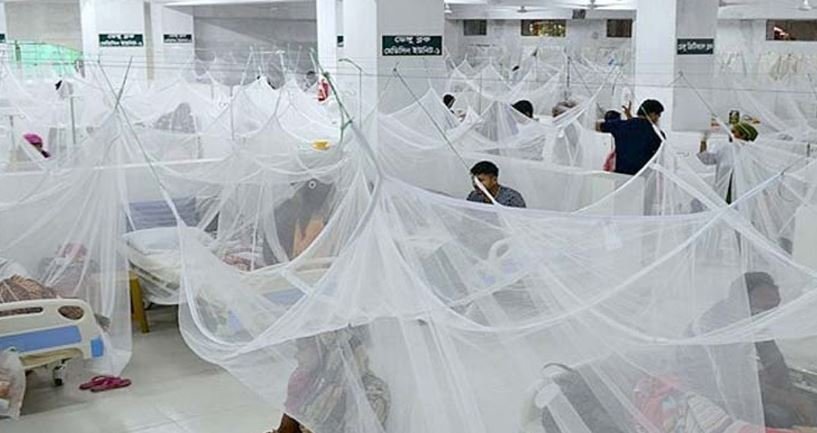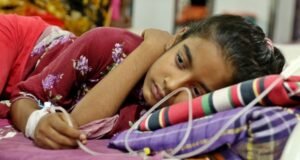
The dengue patients in the countryside have got into deep trouble due to manyfold problems, including lack of facilities for better treatment and saline and test kit crises.
The problems have been deepened as health authorities have asked local health officials not to send patients to Dhaka hospitals which are already flooded with patients.
Prof Dr Ahmedul Kabir, Additional Director General (Development and Planning) of the Directorate General of Health Services (DGHS), at a virtual press briefing on Sunday stated, “Dengue patients were admitted to all upazila health complexes. It is possible to ensure dengue treatment in the upazila hospitals.” However, reports from various district and upazila level hospitals reveal a grim scenario. Patients are encountering difficulties in receiving appropriate care in both government and private facilities due to lack of facilities of better treatment including ICU bed, general bed, dengue testing kits, and saline.
Moreover, patients seeking treatment at ill-equipped private hospitals are becoming victims of financial exploitation, exacerbating the health crisis. Dr Md. Yusuf Ali, UH&FPO of Modhukhali Upazila Health Complex, highlighted the burden on local facilities, with 78 dengue patients under treatment as of last Sunday. “Our stock of dengue test kits is nearing exhaustion. We have requested additional supplies from the health directorate,” he noted.
In Rajbari district, Dr. Mohammad Ibrahim Titon, Civil Surgeon, told the Daily Sun that 97 patients are currently undergoing treatment, with 32 new admissions in the past 24 hours. Hospitals are coping with the influx as best as they can, referring critical cases to nearby Faridpur Medical College Hospital.
Md Farid Hossain, Administrative Officer of Pabna General Hospital, confirmed that the hospital has been facing increased demand for dengue test kits, as patients throng to the hospital for tests.
The public’s frustration is palpable. Residents of districts such as Faridpur and Pabna have voiced their grievances over the lack of adequate testing and treatment services in both government and private hospitals.
Healthcare facilities, already stretched thin, are unable to adequately address the rise in dengue cases. The governmental directive to halt the flow of patients to Dhaka hospitals may have been necessary, but it underscores the dire need for robust healthcare infrastructures across the country, especially as the crisis shows no sign of abating.
Sources from Dhaka hospitals highlight an additional layer of complexity. Sources indicate that the healthcare facilities in the capital are under increasing strain as critical dengue cases from other districts are being redirected to them, even as they grapple with their existing patient load.
Ahmedul Kabir of the DGHS elaborated on the national state of affairs, stating that the number of dengue tests has surged across the country, in part due to flu-like symptoms affecting a broad segment of the population.
In response to the mounting crisis, DGHS convened an emergency virtual meeting on Sunday involving Civil Surgeons, Upazila Health & Family Planning Officers, Divisional health officials, and representatives from Medical Colleges across the country. The primary focus was to formulate measures to manage the escalating situation effectively.
Ahmedul Kabir said fluid management is vital for dengue patients. “It doesn’t necessitate sending them to Dhaka, as this puts patients, especially those in shock syndrome, at unnecessary risk during the long journey.”
Three specific directives were issued by DGHS including formation of rapid response teams in every hospital.
The uptick in dengue cases outside of Dhaka has been alarming. In the past few weeks alone, there has been an approximate 50 percent increase in reported cases in rural areas.
Despite these governmental measures, concerns are running high among residents outside Dhaka. Many fear that local hospitals, already strained to their limits, will be further overwhelmed, raising questions about the healthcare system’s capacity to manage this rapidly escalating crisis effectively.
 Weekly Bangla Mirror | Bangla Mirror, Bangladeshi news in UK, bangla mirror news
Weekly Bangla Mirror | Bangla Mirror, Bangladeshi news in UK, bangla mirror news







